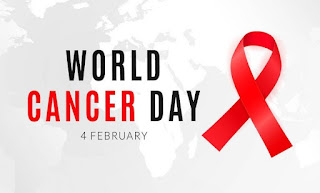World Cancer Day 2022 by Nurse Abdullahi Musa,
World cancer day was initiated by the Union of International Cancer Control (UICC) which was
established in the year 1993. The world cancer day became official at the world summit against cancer
in 2000 and WCD written in the year 2008 to be celebrated 04 February each year to reduce the
cases of cancer diseases and cancer death worldwide. It was first celebrated in Geneva,
Switzerland which the following aims:
• Prevention of cancer
• Early detection and
• Prompt treatment
Now, having all these, the next question coming from the reader is what is this cancer?
Cancer: is an abnormal growth of the cells which are uncontrollable and can be spread to other
neighboring parts.
The human body encompasses different cells such as blood cells, bone cells, and skin cells which
united to form tissues, organs, systems, and eventually to organisms (human beings). The grow and
multiplication of these cells are under the control of a structure inside the nucleus of the cell called
deoxyribonucleic acid (DNA) that carries genetic codes, out of which some of the genes instruct
the cell on when and how to grow and split; therefore when it becomes mutated the end result
might be abnormal growth or division of cells.
GENERAL CAUSES/RISK FACTORS OF CANCER
• Genes mutation
• Hereditary when an individual inherited the abnormal gene
• Harmful chemicals such as asbestos and benzene
• Old age: age is attributed to the development of cancer when an individual aged 60 and above
• Smoking including secondhand smoke from someone
• Exposure to environmental factors such as excessive exposure to sun
• Multiple sex partners and unprotected sex
• Infectious agents such as viruses and bacteria e.g Human papillomavirus and HIV virus
However, having the basics and considering the nature of cancer which carried away the lives of
numerous people over the years particularly cervical cancer it can be prevented. Going
through all these, the reader is thinking of whether there is any sign that an individual will see or
perceive and accuse of having cancer? And before you end up with this question i provided you
with a suitable answer that's YES, there's.
Below are warning signs of cancer tagged with the acronym CAUTION_UP:
• Change in bladder or bowel pattern
• A sore that does not heal
• Unusual bleeding or discharge
• Thickness or lump in the breast or elsewhere
• Ingestion dysphagia
• Obvious change_ wart, and mole
• Nagging cough or horseness
• Unexplained weight loss
• Pernicious anemia caused by Vitamin B12 deficiency
NB: the signs and symptoms depending upon the area affected and severity of the tumor.
In addition, the reader also will be wondering if cancer affects several parts of the body or does
it is restrained to affect only one specific organ or part?
The answer is yes, cancer affects different parts or organs in the body out of which the following
are some examples:
• Bone cancer which affects bone e.g Ewing's sarcoma and osteogenic sarcoma
• Blood cancer which affects blood e.g leukemia acute and chronic myelocytic leukemia and acute and chronic lymphocytic leukemia
• Lung cancer that affects the lung
• Colon cancer which affects the intestines
• Cancer of the esophagus, a passageway for food and water into the stomach
• Bladder cancer, a reservoir for urine
• Prostate cancer and two other most prominent cancers i. e
• Breast cancer which affects either one breast or both
• Cervical cancer, this most deadly among the women who are victims. This type of cancer
affect the lower portion of the uterus (womb) which stand as the connection between the vagina and
the uterus and mostly caused by a virus called human papillomavirus (HPV)
Meanwhile, cancer are classified in two:
1. Malignant cancer: this is the type of cancer that has the capability of spreading to other parts of the
body, thus, metastasize in nature and the prognosis is poor. For example, a cancer of the lung can
spread to esophagus, trachea, larynx other parts of the body
2. Non-malignant cancer: this is the type of cancer whereby the tumor is restrained only in the
the area affected, thus, non metastasize in nature and prognosis is good.
TREATMENT
• Chemotherapy: this involve the use of drugs that have the ability to interfere with the
abnormal cells grow. Such as antimetabolites, purine agonists, alkylating agents vinca alkaloid in
conjunction with other drugs, antibiotics, and steroids anti-inflammatory.
• Radiation therapy: it involves the use of beam light to destroy the abnormal cells.
• Surgery: surgical incision of the tumor.
• Hormonal therapy
Prevention
• Immunization against diseases such as human papillomavirus (HPV)
• Screening such as mammogram for breast cancer, pap smear test for cervical cancer and prostate
specific antigen test (PSA) for prostate cancer
• Avoid smoking including secondhand smoke
• Avoid multiple and unsafe sexes
• Self-breast examination, at the end of every menstruation to detect changes in shape or size of
the breast, discharge, or lump in the breast and report to the appreciate health care facility when
noticed any change.
• Protection against harmful chemicals such as the use of face mask and glass
• Early detection and prompt intervention
In summary, cancer is an abnormal growth of cells that may be malignant or non-malignant
(benign). Cancer affect several parts of the body such as the colon, esophagus, larynx, cervix and
the breast which occurs as a result of infection, exposure to harmful chemicals, hereditary, genes
mutation and aging. Although, some cancers are fatal in nature but preventable.
Thank you.






Comments
Post a Comment